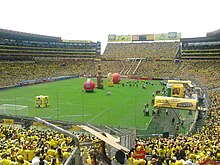Soccer in Ecuador
The origins of football in Ecuador lie in the port city of Guayaquil , where "English sport" was introduced as early as 1899. The country's football strongholds are the port city of Guayaquil and the Andean capital Quito , from which almost all previous national champions came from. Only the champions of 2000 ( CD Olmedo ) and 2004 ( Deportivo Cuenca ) are based in another region of the country.

history
When the brothers Juan Alfredo Wright and Roberto Wright returned to their native Guayaquil from their studies in England , they also brought football with them and founded the Guayaquil Sport Club on April 23, 1899 together with some friends and acquaintances.
In 1922, the first regional championships were introduced in the provinces of Guayas (the capital of which is Guayaquil) and Pichincha (in which the state capital Quito is located). These tournaments, initially operated on an amateur basis, were professionalized in 1951 in the region around Guayaquil and in 1954 in the capital region.
In 1957, for the first time in the history of Ecuadorian football, the two best-placed teams in both regions played a nationwide champions at club level. CS Emelec was the first champion ahead of its arch rival Barcelona SC Guayaquil , who left the two representatives from the capital behind.

The next national championship was held in 1960, this time four teams from both regions participated and again the best teams from Guayaquil could prevail. This time Barcelona won ahead of Emelec and Deportivo Quito as the best capital city club only ended up in fourth place. From now on, the national championship was held annually and the regional tournaments were discontinued after they were last held in 1967.
The record champions are (as of the end of the 2015 season) Barcelona SC Guayaquil with 14 titles ahead of city rivals CS Emelec and CD El Nacional , which was only founded in 1964, both of which were successful 13 times. The CD El Nacional, affiliated to the Ecuadorian military , is the most successful club from Quito, but by no means has the largest following in the capital. Only in sporting terms is the match between CD El Nacional and ten-time champions LDU Quito the biggest derby in the capital. Far more important, however, are the derbies between the LDU and the five-time champions Deportivo Quito and the SD Aucas , which have never been able to become champions, but - in contrast to the army sports club - has a large and passionate following. Therefore, the match between Aucas and LDU is still considered to be the biggest city derby in Quito, while the Clásico del Astillero, the match between Barcelona and Emelec, is considered the most important derby of both Guayaquil and Ecuador.
International competitions
societies
LDU Quito was the only Ecuadorian club to be successful on an international level when they won the Copa Libertadores in 2008 and both the Copa Sudamericana and the Recopa Sudamericana in the following year . In contrast, the two big clubs from Guayaquil only reached the finals: Barcelona SC Guayaquil twice in the Copa Libertadores ( 1990 0: 2 and 1: 1 against Club Olimpia and 1998 0: 2 and 1: 2 against CR Vasco da Gama defeated) and the CS Emelec 2001 in the last edition of the Copa Merconorte (lost on penalties against the CD Los Millonarios ). The nationally more successful city rival CD El Nacional only reached the semi-finals of the Copa Libertadores 1985 , where it failed against América de Cali .
National team
The greatest successes of the Ecuadorian national team at the Copa América were two fourth places in 1959 and 1993 . The first participation in a soccer world championship came in 2002 , when one had to say goodbye after the preliminary round as well as with the third participation in 2014 . Only in the in Germany discharged 2006 FIFA World Cup Ecuador survived the first round and failed in the second round by a free kick from David Beckham with 0: 1 against England .
Individual evidence
- ^ Ecuador - List of Champions at RSSSF
- ↑ Omar Gissler: Football Derbies - The 75 Most Football Crazy Cities in the World . Copress-Verlag, Munich 2007, ISBN 978-3-7679-0883-3 , p. 95
- ↑ a b Futbol Ecuatoriano Historia & Rivalidades (Spanish; accessed October 9, 2016)
- ^ Ecuador - List of Amateur Champions Guayas and Pichincha at RSSSF
- ^ Ecuador - Champions Costa at RSSSF
- ^ Ecuador - Champions and Runners-up Interandinos at RSSSF
- ^ Ecuador 1957 at RSSSF
- ^ Ecuador 1960 at RSSSF
- ^ Carlos Augusto Rojas (El Comercio): Los 'clásicos' en el fútbol ecuatoriano. Los expertos opinan y discrepan (Spanish; article of September 3, 2015)
